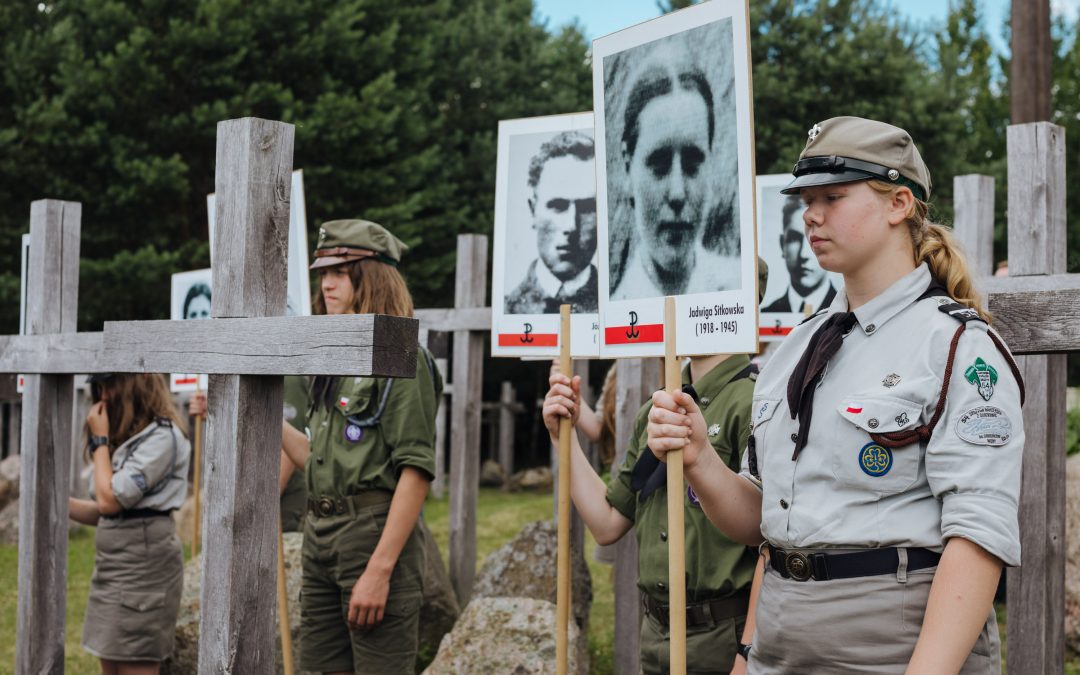Poland has marked the anniversary of the largest communist crime that took place in the country after World War Two, the so-called Augustów roundup, during which hundreds were killed.
In a speech to mark the tragedy, Prime Minister Mateusz Morawiecki called it the “founding murder of communist Poland” and an “unhealed wound”. He also drew parallels to today’s security threats, saying that it reinforces the importance of defending against Russian aggression.
❗️ Premier @MorawieckiM w #Giby: Już nigdy nie dopuścimy, by na polskiej ziemi stanęła stopa rosyjskiego żołnierza. Nigdy nie dopuścimy do tego, chyba żeby któryś z nich chciał klęknąć pod którymś z tych krzyży.
Więcej ▶️ https://t.co/jf6MSnDlBj pic.twitter.com/JjPhuftRel
— Kancelaria Premiera (@PremierRP) July 10, 2022
The operation took place in July 1945, following the defeat of Nazi Germany. Soviet forces, assisted by Polish communists, rounded up underground resistance fighters around Suwałki and Augustów in the Podlasie region of northeastern Poland. Most were detained in internment camps in the Soviet Union and many were killed.
It is believed that at least 2,000 people were detained – though some estimates go as high as 7,000 – and around 600 were killed. The crime has been called a “little Katyn”, referring to the massacre of 1940, when the Soviets murdered around 22,000 Polish military officers and members of the intelligentsia.
As with Katyn, for decades under communism the authorities denied the Augustów roundup and blocked investigations. Even after 1989, it has proved difficult to find official evidence of the crimes, and the location of the victims’ bodies remains unknown.
#OTD 75 years ago the so-called #AugustowRoundup – the greatest #SovietCrime committed on Poles after #IIWW – ended. The #RedArmy, assisted by #PolishArmy and Security Service, conducted a major pacification operation in the area of the Augustów Forest.
➡ https://t.co/20YU7EFTWX pic.twitter.com/TVxSflT2Og— Institute of National Remembrance (@ipngovpl_eng) July 25, 2020
“The Augustów murders are an unhealed wound – a wound that calls for explanation,” said Morawiecki on Sunday, speaking in the village of Giby, where a monument to the victims is located.
“The communist heroes wanted to murder our heroes from the Home Army and those who helped them twice: first by depriving them of their lives, and second by depriving their memory,” he added.
He noted that soon a museum will be created in Augustów at the former headquarters by the Soviet security services to commemorate the victims and “remind the next generations about the truth”.
In a letter read at the commemoration, President Andrzej Duda also pledged that “we will not stop searching for the truth about that crime and commemorating its victims”.
The prime minister also hailed the role that Poland’s underground forces played in resisting the introduction of communism after the war – a struggle that was ultimately unsuccessful but which, he said, laid the groundwork for the regaining of true independence in 1989.
Their actions were “the seed of freedom and solidarity [that become] so important for regaining Polish independence…This seed is still bearing fruit. The brave people who faced down Soviet domination after the war set the moral compass that guides the rulers of our homeland today”.
The current ruling national-conservative Law and Justice (PiS) party has been keen to commemorate the memory of the so-called “Cursed Soldiers” who resisted the introduction of communism. PiS argues that those heroes were not only forgotten under communism, but also under post-communist rule after 1989.
Morawiecki said that the fact that those responsible for the Augustów roundup were allowed “to live to old age in peace” was a “founding sin of the [post-1989] Third Polish Republic”.
PiS and its supporters believe that in 1989 Poland did not truly regain its freedom, but instead remained under the rule of “post-communists” made up of figures from the former regime and their collaborators among the anti-communist opposition.
The prime minister also drew parallels between the situation in the 1940s and today, when Russia is again threatening its western neighbours. “These events [the Augustów roundup] remind us of the importance of ensuring the security of Poland,” he said.
“Today, we put great emphasis on strengthening the security of Podlasie,” he continued. “We must do it so that the russkiy mir [Russian world] will never reign in these lands – this russkiy mir, which today makes its mark on Ukraine, which means violence, terror, crimes and domination.”
“That is why we will never allow the foot of a Russian soldier to stand on Polish soil, in Augustów, Sejny or Suwałki,” declared the prime minister. “Unless that Russian soldier wants to kneel under one of those crosses [at the memorial to the roundup].”
Main image credit: KPRM (under CC BY 3.0 PL)

Daniel Tilles is editor-in-chief of Notes from Poland. He has written on Polish affairs for a wide range of publications, including Foreign Policy, POLITICO Europe, EUobserver and Dziennik Gazeta Prawna.




















